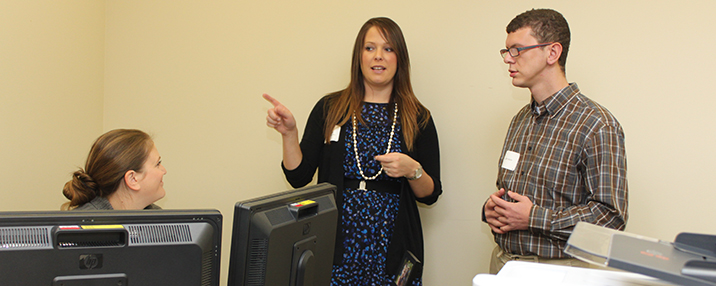CDS offers teens and young adults with disabilities summer-based campus programs that help them identify and work toward their goals; a two-year college program that supports their further acquisition of life skills, education and employment; an app that boosts their ability to independently make health-care decisions; and social events that give them more chances to participate and flourish in the community.
Transition programs for high school students
As students enter their final years of high school, they and their families are usually thinking about what will come next. With funding from the Division of Vocational Rehabilitation (DVR), CDS is helping students with disabilities determine these next steps by offering two dynamic, experiential programs that offer opportunities to learn what it will take to be successful after high school.
“Introduction to Employment” takes place twice per week from January to April and will be virtual. “UDiscover” takes place during two weeks over the summer and is currently expected to take place on campus (virtual option will be offered if necessary). Both programs help students identify and work toward their future goals and become stronger self-advocates for what they need moving forward.
Career & Life Studies Certificate (CLSC) program
Most adults with intellectual disabilities are told they will never go to college. Yet in many ways, college offers the exact type of opportunities that support the goals of people with intellectual disabilities: furthering education, establishing career goals, connecting with peers and learning how to use natural supports and live interdependently.
Students in CLSC attend UD for two or four years. They take undergraduate courses, join clubs, hold internships and can also live in the UD residence halls. The Career & Life Studies Certificate (CLSC) program is the only college program in Delaware designed specifically for people with intellectual disabilities. CLSC is part of a growing national movement which recognizes that students with intellectual disabilities should have the option to attend college.
Spectrum Scholars
Students with autism have incredible talent that too often goes unrecognized. Many autistic students have the ability to succeed in higher education, which can boost their career opportunities. Yet the adjustment to college life can be difficult, given rules for relating with peers and faculty, higher-level academic requirements, and expectations for individual decision-making and self-advocacy.
In collaboration with JPMorgan Chase & Co., UD has developed Spectrum Scholars, a program overseen by CDS that offers a system of supports and career development opportunities for undergraduate students with autism majoring in Computer & Information Sciences or Electrical & Computer Engineering. Spectrum Scholars receive coaching on how to develop study skills, campus connections and self-determination they will need to succeed in college and in their careers. UD faculty and staff, as well as community members, also receive training and consultation as we develop a campus community that increasingly appreciates neurodiversity.
Healthy Transitions App
Many young adults preparing to live independently lack healthcare- and lifestyle-related decision-making skills. To give them more of the support they need, the Center for Disabilities Studies launched the Healthy Transitions App.
This interactive smartphone application uses videos produced by CDS and Healthy Transitions New York to teach young adults the skills they need to become more independent in matters of healthcare, insurance, healthy lifestyles and relationships. A federal grant through the Delaware Division of Public Health funded its development.

